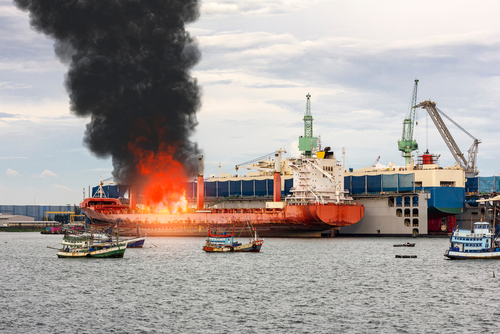
In the early hours of a seemingly ordinary Tuesday, the DALI cargo ship met with an extraordinary and potentially catastrophic incident as it collided with Baltimore's iconic Francis Scott Key bridge. This event has since sparked widespread concern and debate, particularly among conservative circles, regarding the state of our nation's infrastructure and the readiness of our transportation systems to handle emergencies. The National Transportation Safety Board (NTSB) swiftly launched an investigation, uncovering details that raise more questions than answers.
The NTSB's findings, as reported by The Gateway Pundit, reveal a series of alarming technical failures aboard the DALI. Most notably, the voyage data recorder—often referred to as the ship's "black box"—captured six hours of data leading up to the collision. However, this critical period was marred by significant disruptions. Voice recordings essential for piecing together the ship's final moments were heavily distorted by background noise, complicating the investigation.
🚨MUST READ UPDATE: Baltimore Bridge Collapse
The Cargo Ships BLACK BOX Reveals the VDR Sensor Data “Ceased” Recording for 2 Minutes Prior to Impact
🔴 NTSB investigator Marcel Muise held a press conference to reveal the data on the DALI’s black box, also known as the Voyage… https://t.co/pX7rZmdQwZ pic.twitter.com/2oq1KFiOua
— MJTruthUltra (@MJTruthUltra) March 28, 2024
Further complicating matters, the ship's sensors, crucial for navigating and monitoring the vessel's operational status, mysteriously cut off and later resumed. This interruption in data recording could point to a severe malfunction or, worse, an intentional act to tamper with the ship's navigational systems. The absence of CCTV footage or any other form of downloadable data from the ship only deepens the mystery and raises concerns about the security measures in place on such vessels.
Before the collision, the ship's pilot made desperate calls for tugboat assistance via high-frequency radio, signaling a loss of power and control over the DALI. These efforts, however, were in vain as the ship, now a massive unguided missile, barreled towards the bridge. The NTSB's timeline indicates that alarms onboard the DALI began sounding at 1:24 am, with the collision occurring just five minutes later, plunging the bridge into darkness as its lights went out.
The pilot of the cargo ship Dali called for help minutes before it hit a bridge in Baltimore, according to audio from the vessel’s ‘black box’ https://t.co/XNmvqqQNf2 pic.twitter.com/Kl0VJsUhia
— Reuters (@Reuters) March 28, 2024
This incident is not merely a case of a ship colliding with a bridge; it is a glaring red flag highlighting the vulnerabilities in our transportation infrastructure and emergency response protocols. The fact that a single ship could come so close to causing potentially massive structural damage to a critical piece of infrastructure should serve as a wake-up call.
Conservatives have long advocated for robust investment in America's infrastructure, emphasizing the need for modernization and enhanced security measures. The DALI incident underscores the urgency of these demands. It is a stark reminder that our national security and economic stability are only as strong as our weakest link.
Moreover, the mysterious circumstances surrounding the sensor cutoffs and the lack of surveillance footage onboard the DALI raise significant concerns about maritime security. In an era where cyber threats loom large, the vulnerability of our shipping lanes and maritime infrastructure cannot be overlooked. It is imperative that we address these security gaps to safeguard against both accidental and deliberate threats to our national well-being.
In conclusion, the DALI cargo ship collision with the Francis Scott Key bridge serves as a critical case study for the importance of infrastructure resilience, technological reliability, and security vigilance. As conservatives, we must continue to push for policies that prioritize the safety and integrity of our nation's transportation systems. Let this incident be a catalyst for change, driving us toward a future where such avoidable catastrophes are nothing but distant memories.












